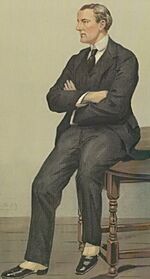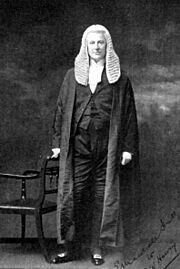Edward Marshall Hall facts for kids
Sir Edward Marshall Hall (born September 16, 1858 – died February 24, 1927) was a famous English lawyer. He was known for being a powerful speaker in court. He successfully defended many people accused of serious crimes, which earned him the nickname "The Great Defender."
Marshall Hall worked as a lawyer during the late Victorian and Edwardian era times. Back then, people were very interested in exciting court cases. Newspapers reported on big criminal and civil trials every day. Because of this, Marshall Hall and other successful lawyers became very famous. Many believed he was a better speaker than a legal expert. This might explain why he never became a High Court judge, which was something he really wanted.
Contents
About Edward Marshall Hall
Early Life and Education
Edward Marshall Hall was born in Brighton. His father, Alfred Hall, was a well-known doctor. Edward went to Rugby School and then to St John's College, Cambridge. He did something unusual by leaving Cambridge for a year to travel in Paris and Australia. After his travels, he returned to finish his law degree.
Family Life
In 1882, Marshall Hall married Ethel Moon. They later separated in 1889. He then married Henriette "Hetty" Kroeger, and they had a daughter named Elna. His older brother, John Cressy-Hall, was a cricketer and businessman. Marshall Hall often helped his brother financially.
Famous Court Cases
The Camden Town Murder Trial
In November 1907, Marshall Hall took on a case that greatly added to his fame as "The Great Defender." On September 12, 1907, a man named Bertram Shaw found his fiancée, Emily Dimmock, murdered in their room. Not much was stolen, so the reason for the crime was a mystery. This case quickly became very famous.
The police investigation focused on Robert Wood. A woman named Ruby Young recognized Wood's handwriting on a postcard found in Dimmock's room. Robert Wood was put on trial for the murder, and Marshall Hall was his defense lawyer.
Marshall Hall was worried about Wood speaking in court. When Marshall Hall asked Wood, "Robert Wood, did you kill Emily Dimmock?", Wood stayed silent. Marshall Hall had to ask again, and Wood finally replied, "I mean, it's ridiculous." This answer could have upset the jury.
Despite Wood's poor answers, Marshall Hall impressed everyone in court. He questioned witnesses very strictly and spoke in a very convincing way. His final speech was so powerful that one person on the jury reportedly fainted! The judge, Mr Justice Grantham, even suggested that the jury should find Wood not guilty. After only 15 minutes, the jury agreed and found Robert Wood not guilty.
Marshall Hall's strong defense convinced almost everyone in the court that Wood was innocent. A large crowd gathered outside the Old Bailey courthouse. When the verdict was announced, a huge cheer went up inside and outside the court. Even plays in London theatres stopped so the audience could hear the news.
The Green Bicycle Case
One of Marshall Hall's most famous cases was called the Green Bicycle Case. This happened near Leicester in 1919. Marshall Hall won the case, even though there seemed to be a lot of evidence against the person accused.
The accused, Ronald Light, had been seen riding a green bicycle with the victim, Bella Wright, on the day she died. He also had a gun similar to the one used to kill her. He later threw the green bicycle into a canal after trying to remove its identifying numbers. He also threw away a gun holster and bullets. On top of all this, he lied to the police.
Marshall Hall used the fact that the prosecution couldn't explain how the murder was planned. The victim herself had said she didn't know Ronald Light. So, how could he have planned her murder? Marshall Hall used this and other points to make the jury unsure if Light was the killer. After about three hours, the jury decided that Ronald Light was not guilty.
Political Career
Besides being a top lawyer (known as King's Counsel), Marshall Hall also served in Parliament twice. He was a Unionist Member of Parliament for Southport from 1900 to 1906. He then represented Liverpool East Toxteth from 1910 to 1916. People were often disappointed because he rarely spoke in Parliament. His speeches there were not as impressive as his powerful courtroom speeches.
Edward Marshall Hall's Legacy
Edward Marshall Hall was born and lived at 30 Old Steine, Brighton. There is a special stone plaque on the wall there to remember him. The building still looks much the same today. The Brighton & Hove bus company even named a bus after him!
In Southport, a street was named Hall Street in his honor. During his life, Marshall Hall earned and lost a lot of money. Sometimes he was very rich, and other times he had very little. When he died, he had a good amount of money. He left it in a trust fund to help young lawyers who were just starting their careers and didn't have much money, just like he had been sometimes. This fund still helps young lawyers today.
Marshall Hall's life was turned into a TV show in 1989 called Shadow of the Noose. It starred Jonathan Hyde as Marshall Hall. Later, in 1996, John Mortimer, who created the character Rumpole of the Bailey, presented some of Marshall Hall's cases in a radio series. Tom Baker played Marshall Hall in this series.
Marshall Hall was also known for his quick wit. In one case involving an Irish worker, a judge asked, "Is your client not familiar with the saying res ipsa loquitur?" Marshall Hall famously replied, "My lord, on the remote hillside in County Donegal where my client hails from, they talk of little else."
Images for kids
 | Lonnie Johnson |
 | Granville Woods |
 | Lewis Howard Latimer |
 | James West |





